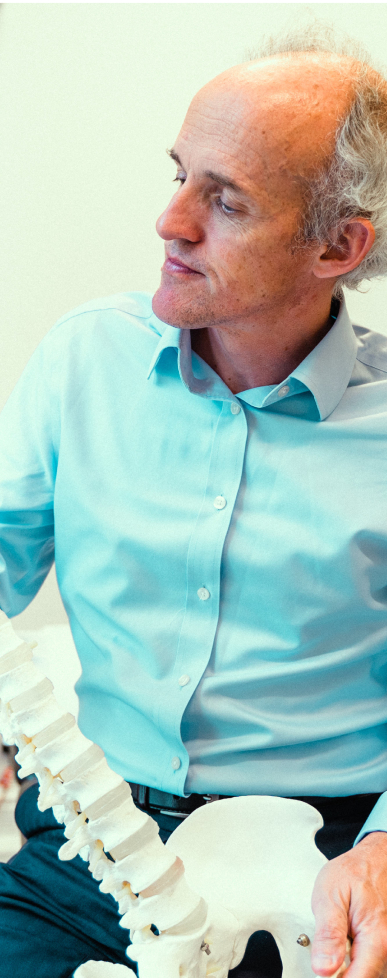Appropriate Analgesia
Most patients do not require surgery for their back problems. At the The UK Spine Centre we manage more than 90% of our patients successfully without surgery.
Good quality conservative treatment can be very effective at managing or resolving pain, restoring function and preventing relapse.
Treatment usually involves a combination of medical treatment, physical therapy, and injections.
We frequently advise on the most appropriate analgesia and can prescribe medication when necessary. However we always try and do this in partnership with your GP who is both an expert in analgesia and more familiar with any other co-existent medical conditions.
Medical Treatment
Several types of medications are available which can be used alone or more effectively in combination.
A good example is ibuprofen taken with co-codamol 8/500 for 2 weeks. Amitriptyline could also be added sooner or later if sleep was disturbed by pain.
Simple analgesia
Paracetamol is the weakest analgesia but well tolerated with few side-effects.
Codeine Phosphate and Tramadol are stronger options. Some individuals can be quite sensitive to these medications.
Codeine Phosphate is often combined with Paracetamol eg. Co-codamol 8/500 or 30/500.
Side-effects with Codeine and Tramadol include constipation and confusion which can affect the ability to work.
Non-Steroidal Anti-inflammatories (NSAIDS)
NSAIDS are also painkillers and help to reduce inflammation. For best effect they should be taken maximally and continuously over 1-2 weeks if tolerated.
Side effects include stomach irritation and nausea. Eg. Ibuprofen (Neurofen), Diclofenac, Naproxen.
These should be taken with or just after food. Sometimes your GP might also recommend taking a tablet to protect the stomach (called a PPI or proton pump inhibitor eg. Lansoprazole)
COX – 2 inhibitors eg. Etoricoxib, Celecoxib. This class of drugs are a more selective form of anti-inflammatory painkiller and can be useful for arthritic pain. Potentially they have fewer side-effects on the stomach and kidneys than traditional NSAIDS but may be associated with a slightly increased risk of heart attacks and stroke.
Opiates
The strongest analgesia available. Morphine comes in tablet, liquid (Oramorph) and skin patch formulations.
Opiates can be very effective when given acutely but for chronic pain is best avoided in younger patients due to tolerance and addiction.
Constipation, confusion and lethargy are common side-effects and a laxative may be prescribed.
Muscle relaxants
Diazepam (Valium) may be given for acute episodes of muscle spasm but is not a long term solution and is addictive.
You may see Diazepam prescribed in the Accident and Emergency department to help get you home, however don’t think of it as a cure. The problem is not with the muscles.
Nerve modulation (anti-epileptic)
Drugs such as Gabapentin and Amitryptyline can be helpful at reducing more specific nerve related pain. For example if you have a trapped nerve in the back and sciatica.
Side-effects are varied but may resolve after a few weeks of taking the medication.
Amitryptyline can be very helpful at night if sleep is disturbed by symptoms, but can hangover into the morning and interfere with functioning in more sensitive individuals.
WE CAN SEE YOU WITHIN 48 HOURS, NO REFERRAL NECESSARY CALL 0208 004 0484
FREE 15 minute consultation
If you’re not sure then book a FREE 15 minute telephone consultation with one of our spine consultants, or just call us with any questions you may have
